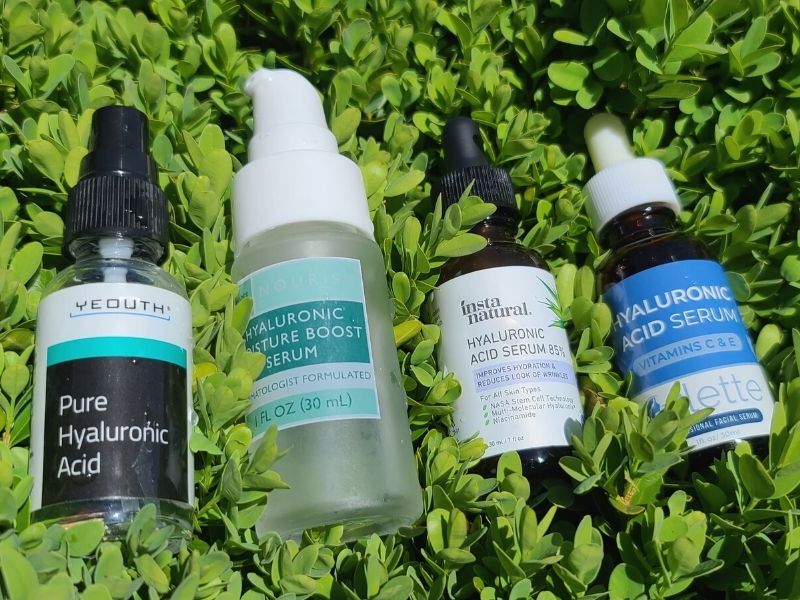Hyaluronic Acid is a form of long-chain sugar molecule that is naturally produced by the body and can be found in human and animal connective tissue and it can also be harvested via microbial fermentation. In addition to skincare and cosmetics, HA is also manufactured for use in the medical field.

This article contains affiliate links; if you purchase a product through my link it may send a small portion of the purchase my way.
Where does Hyaluronic Acid occur Naturally?
Hyaluronic acid can be harvested from synovial fluid found in animal tissue when it is being sourced for cosmetic or medical use. Manufacturers originally sourced hyaluronic acid from cow eye tissue and then turned to primarily using rooster combs around the 1980s.
How is Hyaluronic Acid Sourced from Plants?
Understandably, the rooster comb-based extraction process quickly dropped in popularity due to the animal source, high cost, and pollution caused by the extraction process. Microbial fermentation using plants like wheat instead of animal-sourced material was implemented in the late 1980s. This was much cheaper to accomplish, had a far smaller ecological footprint and did not raise the same concerns about animal-sourced materials.
Deciem (a.k.a The Ordinary) currently uses HA harvested from fermentation in all their skincare products. Vichy, another popular skincare manufacturer states “The Hyaluronic Acid used in Vichy products is naturally derived from wheat.”
Is Hyaluronic Acid Man-Made?
The only alternative to animal-based extraction for sourcing HA for skincare and cosmetics is via fermented plant materials. The bacterial production of HA was first used in 1989 by the Japanese skincare giant Shiseido. This fermentation method also produces a much higher percentage of HA when compared to the extraction process using rooster combs. Fermentation is the primary method used in skincare and cosmetic products but the medical industry does still heavily rely on animal-sourced HA. Check out this video to see what the inside of a facility that creates bacterial sourced HA looks like.

What is the Difference between Hyaluronic Acid and Marine Hyaluronic?
Hyaluronic Acid is usually sourced from animal protein or wheat, while Marine Hyaluronic is created by fermenting marine bacteria. Deciem describes their wildly popular Marine Hyaluronics as “lightweight marine-derived water reservoirs. The formula contains exopolysaccharides from skin-friendly marine bacteria.” If you take a look at the ingredient list you actually won’t find any Hyaluronic Acid at all! The marine hyaluronic you will find on the label is called Pseudoalteromonas Exopolysaccharide, which is created by fermenting marine bacteria. Per a manufacturer of this extract, it packed full of glucuronic acid which is also found in HA.
It’s not quite the same structure as hyaluronic acid but it will result in extremely similar results when used in skincare. If you’re not familiar with the benefits of HA here’s a quick rundown: HA and marine-derived exopolysaccharides help attract and hold water to the skin and help with moisture retention which can, in turn, boost your skin barrier and plump the skin slightly.
Is Marine Hyaluronic better than Hyaluronic Acid?
Both ingredients give almost identical results. Though these are sourced via completely different methods when it comes down to the benefits you will receive, both skincare ingredients are practically the same. There is no reason to pay extra for a “marine-derived” hyaluronic when the functionality of the two are identical. While skincare products from The Ordinary are similarly priced (the marine version is actually a few bucks cheaper than the HA) some brands will upcharge for the exotic sound of a marine-based ingredient.
References:
Microbial production of hyaluronic acid
Producing the Highest Purity of Hyaluronic Acid
Pseudoalteromonas Exopolysaccharides
Recent Posts
There are two new sunscreens on the block and the lovely folks over at Kinfield gifted some tubes for me to to test out so I can share a skincare deep dive with y'all! This post contains affiliate...
Trying to find a sunscreen formulated without glycerin is no easy task! I've researched hundreds of sunscreen formulas while writing for this blog and it's shocking how extremely few glycerin-free...
